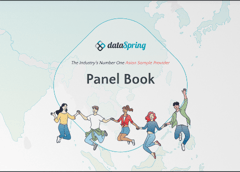-
About dataSpring Get to know your Asian panel insights provider. Meet the Team We aspire to be visionary, passionate, and relentless drivers of dataSpring values.
-
dataSpring Panels Asian Sample We’re ready to serve your research needs with our expansive coverage in Asia. Panel Sources Our secure data comes from proprietary panels, API integration, and third-party partners. Panel Quality Our industry-leading Quality Check System ensures data validity and valuable insights. Operations Enjoy convenient 24/7 support from our highly-capable Springers who speak your language. Get Our Panel BookSolutions Products Complete your requirements with our reliable platforms. Services We provided solutions for every stage of your projects. Mobile Platform Draw in-the-moment insights from Asian mobile consumers with our all-in-one platform. Check our mobile capabilities
-
Resources Blogs Read more on topics about online research solutions to get you started. Eye On Asia Check out the latest trends in Asia and learn valuable local insights. dS Insights Relevant and beneficial market research content, updated regularly. Eye On Asia Podcast Listen to the latest market research news and trends in Asia in dataSpring's monthly podcast.リソース ブログ マーケティングリサーチやアジア諸国の情報について Eye On Asia アジアの最新トレンドをチェックして、現地の貴重な情報を知ることができます。 最新のインサイト情報 アジア地域のパネルについては、毎月実施される自主調査より詳しい情報をご確認いただけます。 Eye On Asia Podcast Eye On Asia Podcastにて、最新のアジアのマーケティングリサーチに関するニュースやトレンドを聞くことができます。
- Ask dataSpring










 Download Panel Book
Download Panel Book


